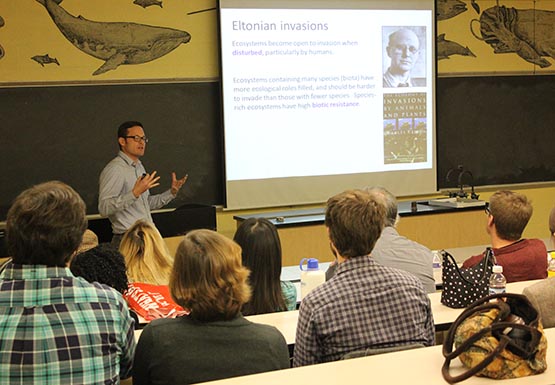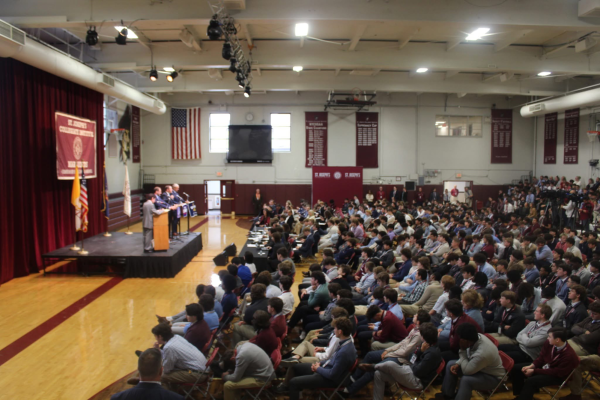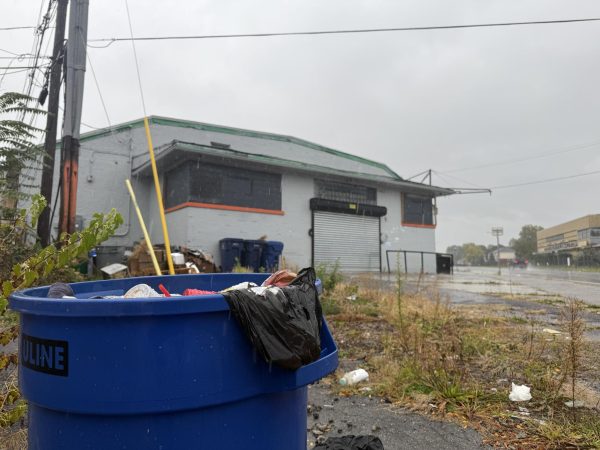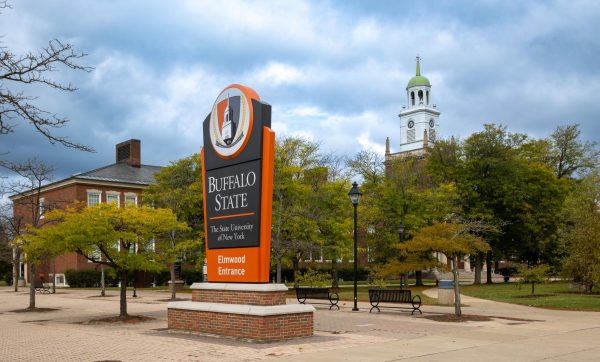Great Lakes Center seminar touches on invasive species

Talking invasive species with Jason Fridley, an associate professor of biology at Syracuse University.
On Friday, Jason Fridley, an associate professor of biology at Syracuse University, spoke at a seminar series for the Great Lakes Center of SUNY Buffalo State.
The seminar was entitled “The modern invasive species problem: A world Darwin Envisioned?” Faculty and students attended the event to learn more about Fridley’s research, theories and contribution to the study of invasive species.
Fridley is also a plant ecologist working at a lab at Syracuse University where “virtually, everything is plant focused,” Fridley said.
His speech focused on “the larger view about species invasion as fundamentally a biological issue and one that might be increasing rapidly because of human agency, but something that perhaps is not human at all, just a fundamental feature of how life works,” Fridley said.
Biology professor and ecologist Robert Warren invited Fridley, a colleague and friend of his, to speak at the seminar to diversify the speakers of the series.
Fridley spoke a lot about Darwin to introduce a modern ecological problem. Warren believes that doing this allowed Fridley to tie in recent research with older research to create ecological evolutionary theories.
“We’re seeing massive changes on the landscape due to invasive species,” Warren said. “Jason’s research is very relevant to the dynamics of seeing the open landscapes around us. When we understand the actual dynamics behind it, it increases ones understanding of the world and how it works.”
The seminar series at the Great Lakes Center has been around for the past six years. Lyubov Burlakova, coordinator for the series and research scientist working at the center and SUNY Research Foundation, said that they usually invite four to six speakers every year from around the Great Lakes area and other states to present their recent scientific findings. Burlakova also said that the topics usually include ecology, aquatic ecology, and invasive biology.
According to Burlakova, the Great Lakes Center has had 35 seminars since 2007, given by leading scientists from various states, including New York, and even abroad.
“It is extremely important to all of our students to gain the understanding of the major steps of the research process,” Burlakova said.
Through the seminar series, students benefit from directly communicating with active researches from various institutions.
“I think it’s nice,” Warren said. “Anything that allows us to be exposed to other ideas, approaches and systems is very worthwhile.”
Burlakova also said that for students, having the seminar series is a great opportunity to be exposed to the latest findings and discoveries in their field. They are able to “see” the steps of the research process as formulation of hypothesis, hypothesis testing, and conclusions.
“That is all a very important part of the education process,” Burlakova said.
According to the Great Lakes Center website, Buffalo is one of 17 large city regions on the Great Lakes. The website also states that this puts Buffalo State in a unique position to provide high quality research and education opportunities to people who are living on and being impacted by Lake Erie and Lake Ontario.
Burlakova said that there might be another seminar this semester, on Dec. 5.
After the seminar, students were invited to a social where they could talk with the speaker and faculty, and discuss their research.
Email: [email protected]











